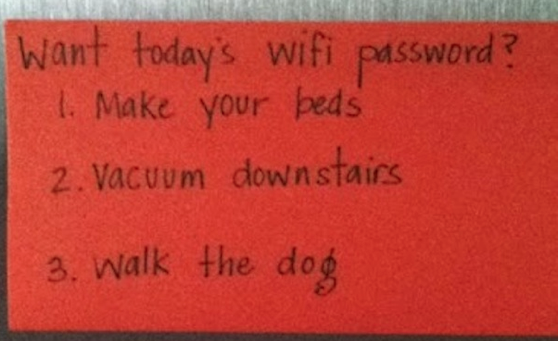
Parents take note: Spain is cracking down on its obstinate teenagers.
Under a draft bill approved in the Spanish Parliament, children under 18 years will be legally obligated to do chores and be ‘respectful.’
If the bill is passed, Spanish children will have to help out with the housework ‘in accordance with their age and regardless of their gender,’ to ‘participate in family life’, respect ‘their parents and siblings,’ ‘respect school rules’ and ‘study as required.’
American parents would probably love nothing more than some legal support to buttress their pleas to have children help around the house. Since there is no telling if this law could ever pass in the U.S., let alone would parents really turn their children in for breaking the law, parents need other strategies to enforce household expectations.
Try these steps:
1) Strengthen your directions. Tell your child what “To do.” Avoid telling your children what not to do, or being vague. Replace “Pick that up” or “Don’t leave your backpack there” with “Put your bag on the hook, now please.” Get your child’s attention and use a calm, polite, but firm tone. Avoid yelling from the next room. Stand next to your child until they begin moving.
2) Avoid lectures. As soon as you start going in to detail about why cleaning the room or doing homework is important your children have tuned out and your lecture actually reinforces noncompliance. If children worked as hard at their chores as they did getting their parents sidetracked we’d live in a world where 6 year olds were curing cancer and solving other World’s problems. You teach them that the direction isn’t that important when you get off track. When your kids begin asking “Why?” or making excuses simply repeat the direction and follow with “or go to timeout.” And then zip your lips and stand and hold until they move into action.
3) Create a method for encouragement. Parents fear giving rewards because they feel it will set the president that the parent must always “pay to play.” Parents also worry about bribing. Parents should have a variety of encouragement strategies. Small rewards like “Thank you,” high fives, thumbs-up and other verbal or physical praise should be doled out handsomely for compliance, following, and appropriate behavior in your home. Simply keeping track of points or putting stickers on a chart are also helpful methods of encouragement that do not necessarily have to be linked to parents shelling out cash. Complex encouragement in the form of token systems or reward charts are known to contribute to meaningful behavior change, especially when parents follow-through. Know yourself and your children and only offer a reward if you can back it up. Not everything has to cost money. Consider weekly rewards like picking the menu for a family dinner, helping mom bake cookies, special private time with one parent, picking a family game. Other low-cost small rewards may be picking a download or itune after 1 week of a successful chore chart. Success should be measured at 70%. So if your child earns 7 of 10 points per day or completes the task for 5 of 7 days a week then the prize could be earned. Small rewards for small successes are more meaningful than big rewards. Avoid promising a new ipod if you get straight As this semester. Instead offer a itune each week for bringing books and homework home 4 of 5 days. You are teaching your child adaptive study habits by using the small reward method.
4) Put your “money” where your mouth is. The biggest barrier to successful behavior change is parent follow through. If you start a behavior chart pick a time to check it daily. Without exception. If your child is slow to start or get the hang of the new chart consider making some changes to help your child be successful or have a “dress rehearsal” day to practice and role play what the expectations are. If you make a contingency contract like “If you make your bed each morning this week you can take a friend to a movie on Friday.” Then you must follow through even if your kid has a horrible attitude and temper tantrums all day Friday. Have a separate list of consequences for misbehavior than taking away earned privileges, The same goes for consequences. If you threaten to take something away, privilege loss or work chore for misbehavior then you must follow through. As stated above small rewards are more meaningful than big ones, small consequences are as well. For parents small consequences are easiest to reinforce. If you take TV away for a week you punish everyone in the house and likely lose track of what the punishment is. Parents often say, “My kids don’t care if I take away the iPod because they just go find something else.” Your kids do care and they care if it’s lost for 10 minutes. This also allows you to give it back and take it away again if there are multiple successive misbehaviors during the same day.
5)
Get Creative. The internet is full of awesome ideas for rewards and consequences. Pinterest has lots of fun images to help parents come up with ideas for small but meaningful rewards or consequences. One that stands out is that kids must do their daily chore in order to get the wifi password. This genius idea is free for parents and just takes the time to figure out how to change your password and remembering the password you create each day.

Get technology on your side! Check out http://appadvice.com/appguides/show/chore-management for some ipad/iphone chore apps to help parents and kids track completion of chores and earn rewards.
It is important to address noncompliance because children who do not follow are likely to be rejected by parents, teachers, and peers. Rejected young people are more likely to identify with delinquent friends and/or try drugs and alcohol. If you apply all of the abovementioned steps and are still having trouble with your child or teen’s defiance, noncompliance or disrespect you may value from speaking to a therapist. Birmingham Maple Clinic has trained experts in individual and family therapy to uncover and treat any mental health or emotional issues that may contribute to poor attention and completion of tasks as well as helping families to improve communication and reduce stress. If you would like to speak to a therapist make an appointment at www.birminghammaple.com or by calling (248) 646-6659
Read more on the proposed bill: http://www.dailymail.co.uk/news/article-2616155/Spain-considering-laws-FORCE-children-household-chores-make-not-polite-illegal.html#ixzz30T0BvagC


